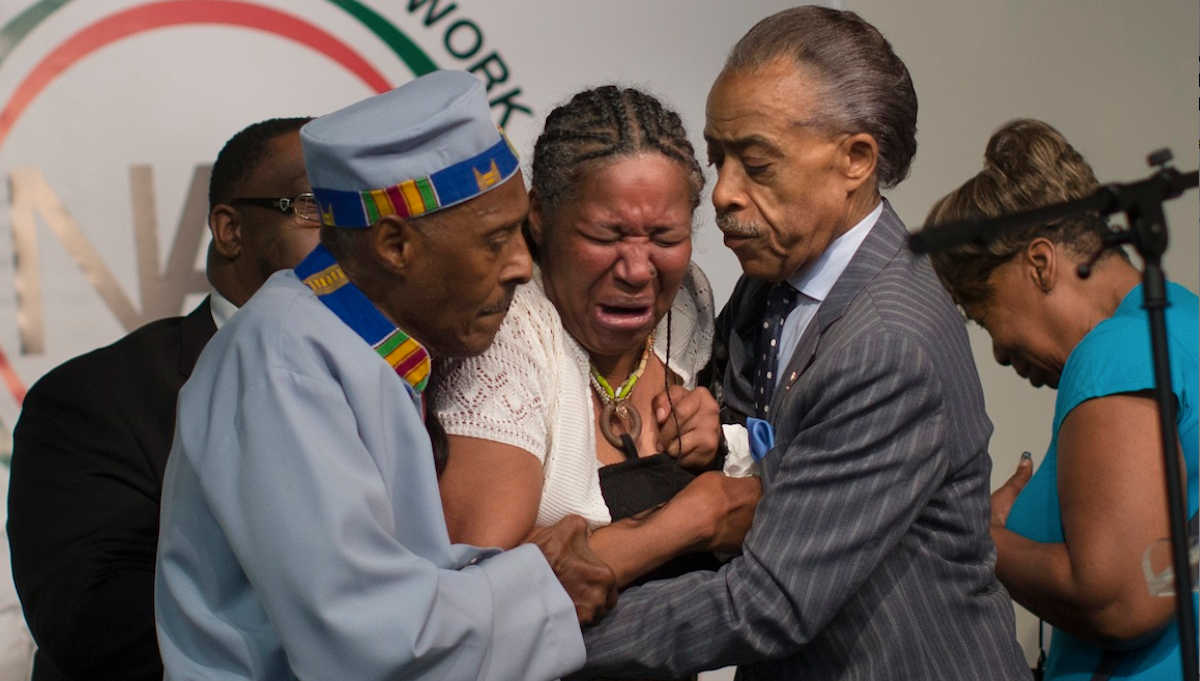Two words on Eric Garner grand jury decision: Not again

Esaw Garner, wife of Eric Garner, breaks down in the arms of Rev. Herbert Daughtry, center, and Rev. Al Sharpton, right, during a July rally at the National Action Network headquarters for Eric Garner. (AP Photo/John Minchillo)
Not again.
Not another unarmed man killed by those whose salaries we pay. Not another death swept aside by grand jury proceedings. Not another black man killed on the street by police.
Not again.
On the heels of the shooting death of unarmed teen Michael Brown in Ferguson, Mo., yet another racially tinged killing has taken place. And yet another grand jury has acquitted a white police officer in the death of an unarmed black man.
But unlike the death of Michael Brown, the death of Eric Garner was videotaped and ruled a homicide by the New York City Medical Examiner’s Office.
And yet, despite cell-phone videos chronicling Garner’s death, and lawsuits previously filed against the officer who choked him to death, and Garner wheezing “I can’t breathe” numerous times as he died, a grand jury decided not to indict anyone in his death.
Sad reality
The sad truth of this tragedy is that Eric Garner, a 43-year-old father of six who was in poor health even before he died, was not approached by the police because he was a hardened criminal.
He wasn’t approached because he was suspected of killing anyone.
Police confronted him because he was suspected of selling loose cigarettes and, at the end of the encounter, he paid with his life.
Even in the most Draconian societies, such a crime would most likely result in a slap on the wrist. But in America, for Eric Garner, the crime of selling loose cigarettes, and asking to be left alone, carried the death penalty.
The confrontation
The encounter began when police approached Garner on a Staten Island street corner, and Garner believed he was being harassed.
“Every time you see me, you want to mess with me,” he said on a video that was recorded by a passerby. “I’m tired of it. It stops today. I’m minding my business. Please just leave me alone.”
The video then shows Garner being violently arrested by four officers, including Daniel Pantaleo, an eight-year NYPD veteran. In the video, Pantaleo approaches Garner from behind and places him in a chokehold — a move banned by the New York City Police Department.
Garner says “I can’t breathe,” several times as the officers are seen pushing Garner’s face into the sidewalk.
Minutes later, as the father and grandfather lies motionless on the concrete, the officers mill about, doing nothing. Four minutes into the videotaped encounter, four paramedics arrive, and while one of them takes Garner’s pulse, they also essentially do nothing to revive him.
Officer’s track record
Perhaps this made no difference to the grand jury, but Pantaleo had already been sued in similar incidents.
In one lawsuit, which was settled, two black men in their 40s accused Pantaleo and other officers of subjecting them to a strip search on a Staten Island street, and ordering them to pull their pants and underwear down, squat and cough.
In a second lawsuit, a man accused Pantaleo and other officers of lying on a police report to justify charges that were eventually dismissed.
But despite Pantaleo’s record in this regard, the Patrolmen’s Benevolent Association, a New York police union, still defended him.
After Garner’s death was ruled a homicide, the organization cited the New York City Medical Examiner’s report, which said Garner’s acute and chronic bronchial asthma, obesity and hypertensive cardiovascular disease were contributing conditions in his death.
Then, they placed the blame on Garner.
“[I]f he had not resisted the lawful order of the police officers placing him under arrest,” the organization said in a statement, “this tragedy would not have occurred.”
Perhaps. But here’s an even bigger truth: If Pantaleo had been relieved of his duties after abusing citizens and lying on police reports, he would not have been in a position to kill an unarmed man who was being investigated for nothing more than selling loose cigarettes.
If the New York City Police Department had decided to address Pantaleo’s behavior rather than paying out a settlement to sweep it under the rug, this killing would not have happened.
If the grand jury had indicted Pantaleo in what the New York City Medical Examiner had already ruled a homicide, perhaps Eric Garner’s death would not be in vain.
Unfortunately, that’s not the case, and in the numbness that comes with that reality, I can only stare blankly into the emptiness of the moment, and utter two words:
Not again.
WHYY is your source for fact-based, in-depth journalism and information. As a nonprofit organization, we rely on financial support from readers like you. Please give today.


